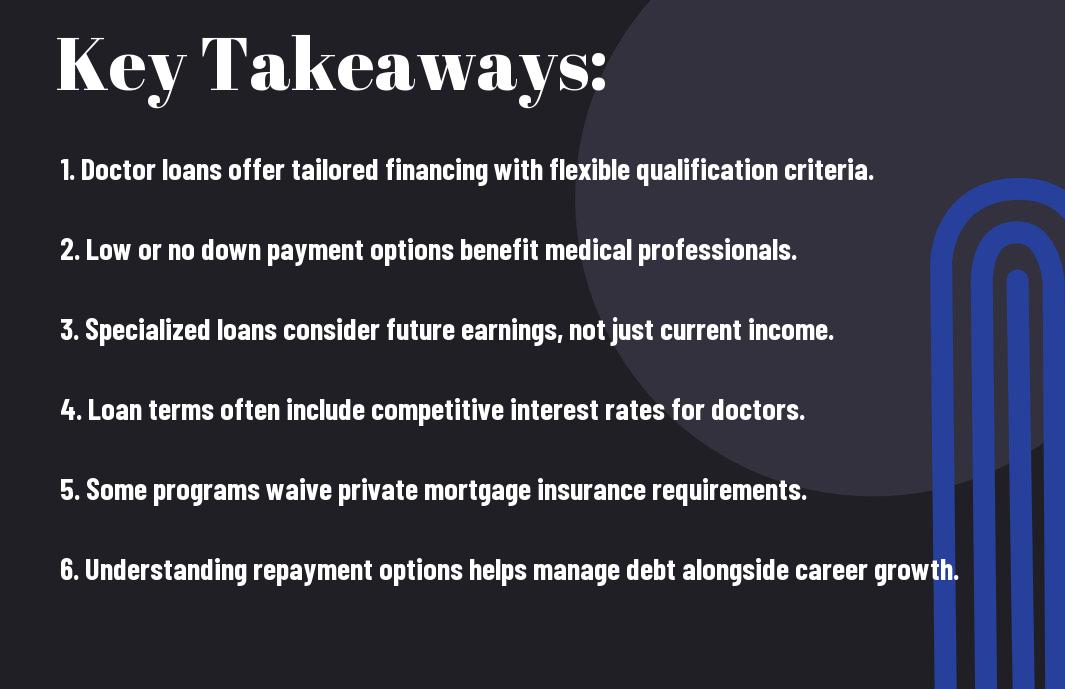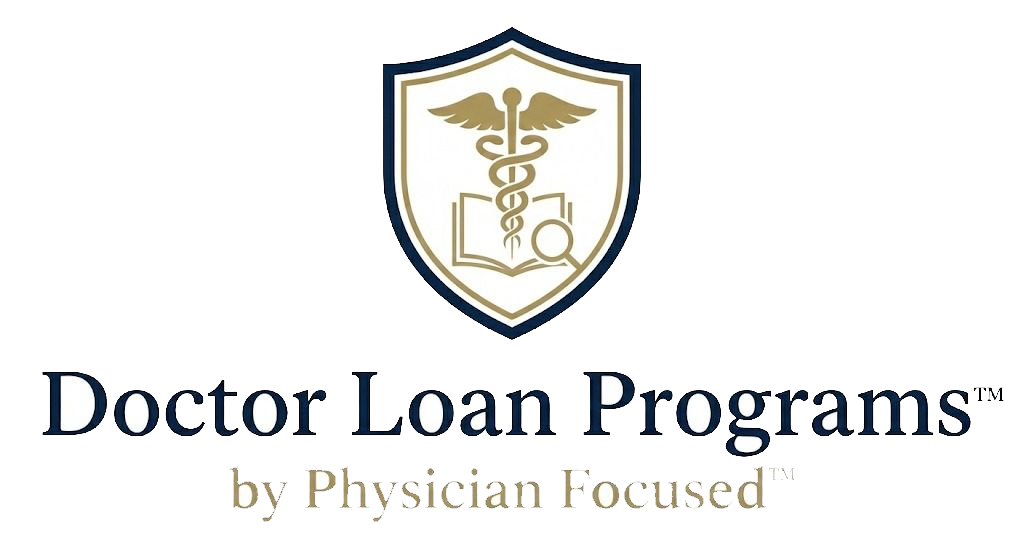With the rising costs of medical education and the unique financial challenges you may face as a physician, understanding loan programs tailored for doctors is vital. This comprehensive guide will walk you through various options available, highlighting the key features, benefits, and considerations you need to make informed decisions. Whether you’re a medical student or an established practitioner, having the right knowledge can empower you to secure the financial support that best fits your career path.
Decoding Loan Fundamentals Tailored for Medical Professionals
Navigating loan programs as a physician means understanding distinct fundamentals that set you apart from other borrowers. Many lenders offer specialized loans designed to accommodate the unique financial timeline and responsibilities of medical professionals. You may find terms like income-driven repayment, forbearance options, or residency deferment, which reflect your specific circumstances. Grasping these elements early on can save you time and money, enabling you to focus on what truly matters—your practice and patient care.
Dissecting Loan Terminology: Key Terms Every Doctor Should Know
Familiarity with necessary loan terminology can be a game changer. Terms such as amortization, interest rates, and debt-to-income ratio may appear daunting, but they’re pivotal to your financial planning. Understanding these terms ensures you make informed decisions about your loans and repayment strategies. For instance, knowing how amortization affects your monthly payments can aid in budgeting, allowing you to allocate funds towards other critical areas like clinical equipment or personal expenses.
The Unique Financial Landscape Physicians Navigate
Your financial landscape as a doctor is characterized by high student debt but also high earning potential. The typical medical school graduate leaves with around $200,000 in student loans, yet early career salaries often exceed $200,000 and can rise significantly as your career progresses. However, the challenging transition between residency and full-time employment means you might encounter cash flow gaps, making specialized loan programs necessary for managing your finances effectively during this period.
Understanding this dichotomy can shape your financial decisions profoundly. While your earning potential is significant, the timing of your income is often staggered, particularly during residency. Thus, opting for a loan program that allows you to defer payments or offers lower interest rates is vital. This can ease your financial burden, allowing for greater stability until your practice matures. Each financial decision impacts not just your present circumstances but also defines your future financial health, making it necessary to navigate this landscape wisely and strategically.

Specialized Loan Programs: Unlocking Opportunities for Doctors
Specialized loan programs tailored for doctors offer unique advantages that can significantly ease the financial strain associated with medical education and setting up practice. These programs often feature higher loan limits, lower down payment requirements, and more flexible credit criteria, allowing you to step into homeownership sooner. By taking advantage of these tailored offerings, you can secure funding that aligns with your specific career trajectory and financial situation, ultimately helping you focus more on your practice and less on financial burdens.
Exploring Doctor Loan Programs: Features and Benefits
Doctor loan programs typically come with several enticing features, such as no private mortgage insurance (PMI) requirements and up to 100% financing for qualified buyers. These benefits allow you to allocate resources more efficiently, ensuring that you can invest in your career and personal life without continually stressing over monthly payments. Additionally, many of these loans consider future income potential rather than solely relying on current earnings, enabling you to buy a home earlier in your career.
Comparing FHA, VA, and Conventional Loans: What Works Best for Clinicians
Each type of loan offers distinctive advantages and may cater to different financial scenarios. FHA loans allow for lower down payments but come with mortgage insurance, which can increase long-term costs. VA loans are exclusively for veterans and active military personnel, offering great benefits like no down payment and no PMI. Conventional loans require a solid credit score but can be advantageous if you have a higher down payment. Understanding each option’s nuances allows you to select the approach that aligns best with your financial goals.
Loan Type Comparison
| Loan Type | Key Features |
|---|---|
| FHA Loan | Low down payment (3.5%), requires mortgage insurance |
| VA Loan | No down payment, no PMI, exclusive to veterans and active duty |
| Conventional Loan | Higher credit requirements, good for those with substantial down payment |
Home financing options can dramatically affect your financial landscape as a clinician. FHA loans may be appealing for those with limited savings, while VA loans present an excellent opportunity for eligible military personnel, offering remarkable terms and benefits. If you’re planning a larger investment, conventional loans could potentially provide lower overall interest rates, especially if your credit profile is strong. By weighing these factors carefully, you can make an informed decision that enhances your financial stability as you initiate on your medical career.
Loan Type Detailed Analysis
| Loan Type | Advantages & Disadvantages |
|---|---|
| FHA Loan | Adv: Lower down payment; Dis: Substantial mortgage insurance |
| VA Loan | Adv: No PMI and down payment; Dis: Available only to qualified veterans |
| Conventional Loan | Adv: Potential for lower rates; Dis: Higher credit score required |
Strategies to Strengthen Your Loan Application
Strengthening your loan application involves a combination of financial preparedness and strategic presentation. Start by ensuring that your credit score is as high as possible, ideally above 700, as lenders often consider this a key indicator of your reliability. Additionally, providing a clear and organized overview of your income, expenditures, and assets can significantly enhance your appeal. Tailoring your application to highlight your future earning potential in your specific medical field can also work in your favor, demonstrating that you’re a low-risk borrower.
Building Your Financial Portfolio: What Lenders Want to See
Lenders seek a robust financial portfolio that reflects stability and growth. They want to see a consistent income stream, with documentation of salary, bonuses, and employment history. Additionally, having savings or liquid assets, such as investments or emergency funds, suggests you have a safety net. Highlighting any professional liabilities is also vital, as lenders prefer borrowers with manageable debt levels and a strong outlook on long-term earnings potential.
Common Pitfalls to Avoid in Your Application Process
Falling into common pitfalls can derail even the most solid applications. Incomplete documentation is a frequent issue; be meticulous in gathering all required financial records, and double-check for errors. Underestimating the importance of timing can also cause setbacks; apply well ahead of when you need funds, ensuring your application is processed without a rush. Moreover, failing to communicate openly with lenders about any financial challenges can create mistrust or misunderstandings.
Inattention to detail in your application can lead to unnecessary delays. For instance, errors in your credit report may need to be resolved before the loan process can continue. Omitting necessary documentation, like recent bank statements or tax returns, can result in additional requests for information that stall your progress. Lastly, not disclosing certain debts could raise red flags for lenders if discovered later, jeopardizing your loan approval. Approach your application methodically and proactively to avoid these common missteps.
The Impact of Debt on Medical Practitioners
The financial burdens associated with medical education can significantly affect a physician’s career trajectory and personal finances. Many medical practitioners enter their professions with substantial debt from student loans, which can limit their choices in job opportunities, living arrangements, and lifestyle preferences. High levels of debt can also lead to stress and burnout, impacting overall job satisfaction and mental health. Understanding the implications of this debt on your finances is important for navigating your options effectively.
Analyzing Student Loan Burdens and Their Long-Term Effects
Student loans represent one of the largest financial obligations you’ll face after medical school, often totaling over $200,000 for many graduates. This debt can shape your financial future, affecting your ability to invest, save for retirement, or purchase a home. The high monthly payments may restrict your career choices, pushing you towards higher-paying specialties rather than those aligned with your passions. Awareness of these long-term impacts is integral to making informed decisions about your financial health.
Strategies for Managing Debt While Pursuing Home Ownership
Managing debt while aspiring to buy a home can feel overwhelming, but there are strategies to streamline the process. Prioritize consolidating or refinancing your student loans to achieve lower monthly payments and favorable interest rates. Take advantage of income-driven repayment plans that align your payments with your current earnings. Furthermore, setting a strict budget can help you save for a down payment while simultaneously managing your debt, allowing you to balance both financial goals effectively.
Consider leveraging specialized loan programs designed for medical professionals, which often offer competitive rates and favorable terms. Engaging with a financial advisor familiar with the unique circumstances of doctors can provide tailored strategies, such as the potential for lower down payment options or first-time homebuyer incentives. In addition, consistently keeping track of your credit score will aid in securing better loan terms, making it easier to achieve your goal of home ownership despite existing debt. By proactively tackling your financial obligations, you can create a path that accommodates both home ownership and debt management concurrently.
Future Trends in Loan Accessibility for Medical Professionals
As the healthcare landscape evolves, so too do the loan programs available to medical professionals. Emerging trends indicate a shift toward more accessible and flexible financing solutions, designed to accommodate the unique needs of those in the medical field. Increased collaboration between lenders and medical associations is fostering custom loan products, including lower interest rates and terms that consider a physician’s career trajectory. The proliferation of technology in the lending process is streamlining applications, allowing for quicker approvals and better service overall.
How Policy Changes May Affect Loan Programs for Doctors
Legislation surrounding student loan forgiveness and interest rates can significantly influence your borrowing options. Recent discussions in Congress regarding the Public Service Loan Forgiveness program indicate potential expansions, which may ease the burden on medical professionals servicing in underserved areas. As these policy changes unfold, they can either enhance or limit the availability of specific loan programs tailored for physicians, highlighting the need for you to stay informed about impending reforms.
The Rise of Alternative Financing Options: What’s on the Horizon
Alternative financing options, including crowdfunding and peer-to-peer lending, are gaining traction among medical professionals seeking financial support. These platforms offer creative solutions to traditional loan barriers, allowing for greater flexibility in funding various medical endeavors, such as home purchases and practice loans.
Innovative funding sources are emerging to cater specifically to the needs of medical practitioners. For instance, platforms that specialize in connecting health professionals with investors recognize the value of your expertise, offering better terms compared to conventional lenders. Additionally, private equity firms are increasingly interested in funding medical practices directly, allowing you to bypass traditional loan structures altogether. As these alternatives continue to develop, they present exciting possibilities for securing the financial resources necessary for your career and practice expansion.

To wrap up
Taking this into account, navigating the world of loan programs for doctors can be straightforward when you understand your options and requirements. You should explore various loan programs, including those tailored specifically for medical professionals, to find the best fit for your financial situation. By being informed about interest rates, eligibility criteria, and repayment terms, you can make educated decisions that will support your career and financial goals. Embracing this knowledge empowers you to manage your finances effectively as you begin on your medical journey.




